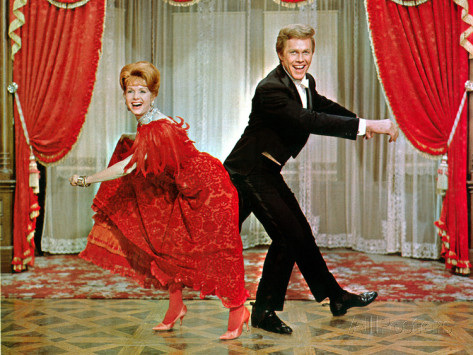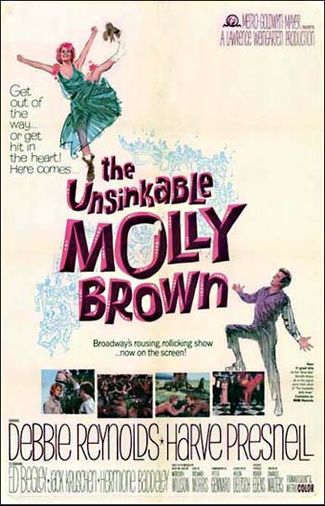The Honoraries: Debbie Reynolds in "The Unsinkable Molly Brown" (1964)
 Tuesday, November 10, 2015 at 7:00PM
Tuesday, November 10, 2015 at 7:00PM This week we're celebrating the three Honorary Oscar winners. Here's abstew on Debbie Reynolds' favorite role.

Molly Brown is my favorite of all the roles I've played. I love something about almost every part I've done, but I identified with Molly as soon as I met her. In the sometimes blurry line between art and and real life, Molly is the woman I've become as the years have passed. I'm right there with her when she declares, "I ain't down yet!"
-Debbie Reynolds Unsinkable: A Memoir
 In her decades long show business career, amid the watchful eye of media scrutiny, Debbie Reynolds has endured trials and tribulations and come out the other side of it stronger. Caught in a Hollywood scandal, the original jilted girl-next-door (long before Jennifer Aniston was even born), Reynolds stood by while then husband Eddie Fisher left her and her two young children for screen siren Elizabeth Taylor. Her luck with men didn't improve later as second husband Harry Karl spent years gambling away her hard-earned money, leaving her with mounting debts to cover. Even her dream of finding a permanent home to house her legendary collection of movie memorabilia never came to pass and forced her to put them up for auction. So you can see how playing a character like the real life Molly Brown, who survived the sinking of the Titanic, earning her the moniker "Unsinkable", would find a kindred spirit in the guise of feisty spitfire Debbie Reynolds. The actress, like the legendary woman, simply doesn't know what it means to be defeated...
In her decades long show business career, amid the watchful eye of media scrutiny, Debbie Reynolds has endured trials and tribulations and come out the other side of it stronger. Caught in a Hollywood scandal, the original jilted girl-next-door (long before Jennifer Aniston was even born), Reynolds stood by while then husband Eddie Fisher left her and her two young children for screen siren Elizabeth Taylor. Her luck with men didn't improve later as second husband Harry Karl spent years gambling away her hard-earned money, leaving her with mounting debts to cover. Even her dream of finding a permanent home to house her legendary collection of movie memorabilia never came to pass and forced her to put them up for auction. So you can see how playing a character like the real life Molly Brown, who survived the sinking of the Titanic, earning her the moniker "Unsinkable", would find a kindred spirit in the guise of feisty spitfire Debbie Reynolds. The actress, like the legendary woman, simply doesn't know what it means to be defeated...
It's her tenacity and persistence that earned her the role of Molly Brown in the film version of Meredith Wilson's Broadway musical in the first place. After the success of the stage-to-screen transfer of Wilson's The Music Man, Hollywood was eager to bring the composers newest work to movie audiences. Reynolds plead her case to director Charles Walters, whom she had previously worked with on the film The Tender Trap (1955), even joking that she would do the part for free. But Walters could only see Shirley MacLaine in the role (despite winning a Tony award for her performance, Broadway's Molly Brown, Tammy Grimes, was never considered for the screen version). After announcing that MacLaine had won the role to appear in the MGM production, producer Hal Wallis sued, claiming that MacLaine was still under contract at Fox.
Reynolds, who was already a contract player at MGM, still had to fight for it. After meeting again with Walters he still wasn't convinced. He felt she wasn't right for it because she was too short. "Well, how short is the part?" joked Reynolds, securing her place in the film - at a much smaller fee than she was accustomed. (Apparently she shouldn't have joked about working for nothing.) MacLaine was furious that Reynolds "stole" Molly from her and told the press that Reynolds purposely agreed to lower her salary in order to secure the part. (MacLaine even allegedly punched a Hollywood Reporter writer that first broke the story about her ousting.) In the years since, the women resolved their conflict and MacLaine even played the fictional version of Reynolds in Mike Nichols' Postcards from the Edge (1990) written by Reynolds' daughter Carrie Fisher. Reynolds had lobbied for the role herself but was told she wasn't right for it...

No one can ever accuse Reynolds of not being completely committed. And she throws herself into the role of Molly Brown with so much energy and enthusiasm that you think she can't possibly sustain that level of intensity for the entire movie - but you'd be wrong. Reyonlds is relentless. In her early scenes in which the backwoods tomboy Molly vows to learn to read and write and marry a wealthy man, she's like a feral animal stomping, spitting, and clawing her way into the character. She attacks songs in a way that make you forget that she's an actual singer and adds so many extraneous grunts and howls that it feels she's actually channeling a wild beast in need of taming. It's only in her later scenes when Reynolds allows herself to breathe and settles in to Molly's new found maturity (realizing that money doesn't buy you happiness or respect) that you realize what an amazing journey the character and Reynolds have navigated.
But the film, an old-fashioned clunker that barely resembles the show it was based on, does Reynolds no favors. All but 5 of the Broadway musical numbers were eliminated from the film and an added song "He's My Friend", an elaborate 7 minute dance number, was almost cut from the film entirely when MGM, losing millions from the over-budget Doctor Zhivago, looked to cut costs. They ended up filming the entire sequence with several cameras in only one day. (It took so much out of the performers that one of the dancers collapsed after they wrapped for the day.) And I've never understood why the one thing that made Molly Brown famous in the first place, her heroism during the tragedy of the Titanic (and the inspiration for the title), barely covers 5 minutes of the film's runtime.

But the film ended up being a success and would end up being the only performance that earned Debbie Reynolds an Oscar nomination. (She lost Best Actress that year to another musical performer, Julie Andrews in her screen debut in Mary Poppins.) And in addition to Reyonlds' acting nom, the film received 5 other nominations for Cinematography, Art Direction, Costume, Sound, and Music. Reynolds would also revisit Molly years later when she and co-star Harve Presnell (who played husband Johnny Brown) reprised their roles in a national tour of the musical in 1989. You can see why Reyonlds would want to return to the material having formed a bond with Molly and her resilient fortitude. And now years later, Reynolds is meeting up with Oscar again as well. This time receiving the Jean Hersholt Humanitarian Award in honor of her decades of commitment to the Thalians, an organization dedicated to education and treatment of mental health issues. And it couldn't have happened to a better woman. She's endured so much and just like Molly Brown, still ain't down yet!



Reader Comments (7)
Nice overview of how the character really does fit the real life Debbie so well. The film is entertaining in a big overblown way but for me its not one of the classics of the genre. It had originally been intended for Doris Day but her previous musical, Jumbo, had flopped and that is when they moved on to Shirley. I glad that the role went to Debbie rather than Shirley I can't quite see her inhabiting it the same way.
That's a good point about how little of the film actually looks at her time on the Titanic. Not only is it brief but if I remember correctly, it's been years since I've seen it, she ends up in some sort of camisole, fur coat and a string of pearls in the lifeboat hardly what the matronly real life Molly would have stepped into a lifeboat wearing in 1912!
Yessss!!! So glad you've covered this! Delightfully juicy bits about MacLaine. I was the perfect age when Titanic came out (9 or 10) and just ginger enough to go completely insane over this characterization of "Molly Brown." It carried me through high school, when I (horrifically) sang "Belly up to the Bar" during my choir show and into college when I became a tour guide at the Molly Brown house museum in Denver.
Fun facts: she never hid money in the stove and lit it on fire: even if she had it wouldn't have mattered because money towns used coins not paper money. Also, the house is much, much smaller than the palace depicted in the film. But she did have a second holiday home with a dance floor. Her Titanic myth is interesting too: she wasn't the sole strong woman urging all of the crying useless women to row. She was one among a handful of ringleaders and found many willing accomplices. She had also just visited Egypt with her daughter and had an Egyptian "talisman" that she considered her good luck charm after the sinking. Her daughter changed her travel plans last minute and wasn't on board. After the sinking she gave medals to the staff and crew of the ship and erected a monument to the men who lost their lives. She spoke five languages, was a social favorite (rather than a denigrated "new money" wannabe), and had only a mild Missouri accent. Belly up!
Mining towns not money towns, oops!
An interesting bit of background to a film & star that deserve the recognition.
I love Debbie Reynolds so much and this is indeed one of her best, most enduring performances. LOVE the write-up, too - although I can't fathom why the director could ONLY see Shirley MacLaine as Molly.
Debbie Reynolds is so much more striking than most of her movie vehicles. It's like meeting someone at an occasion and really liking them. You don't remember what the occasion was, or the menu, etc. you just remember how delighted you were to meet this person.
Who were the two male dancers with Debbie Reynolds in the last part of "He's My Friend"?